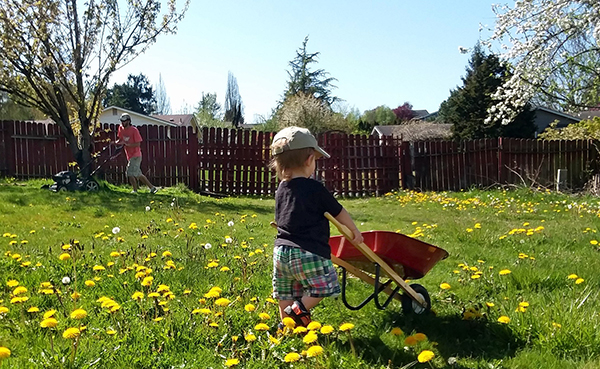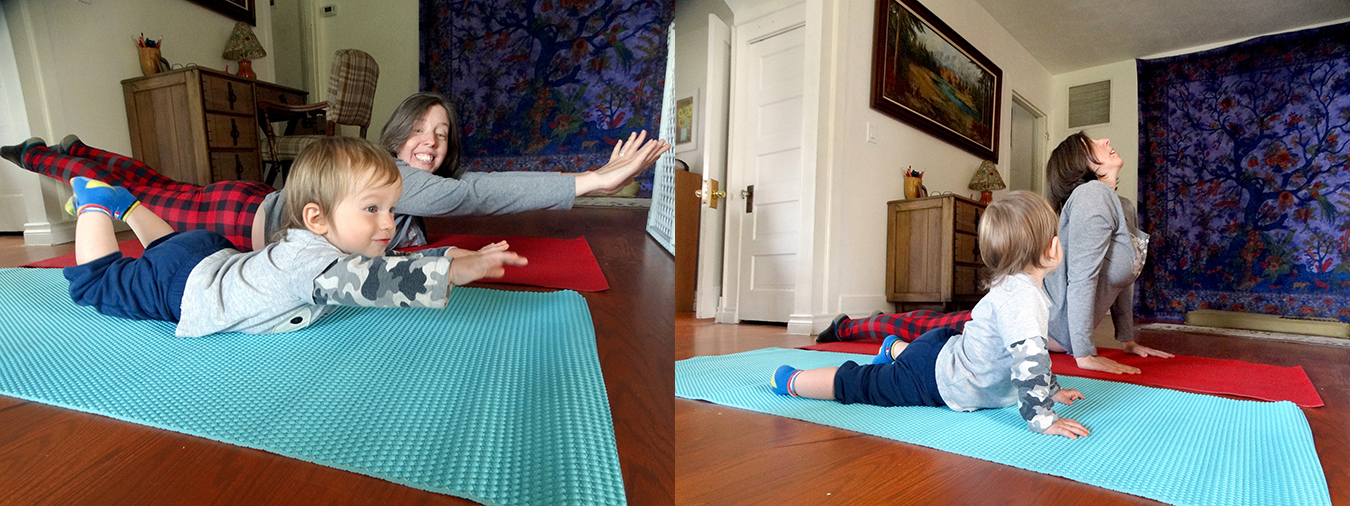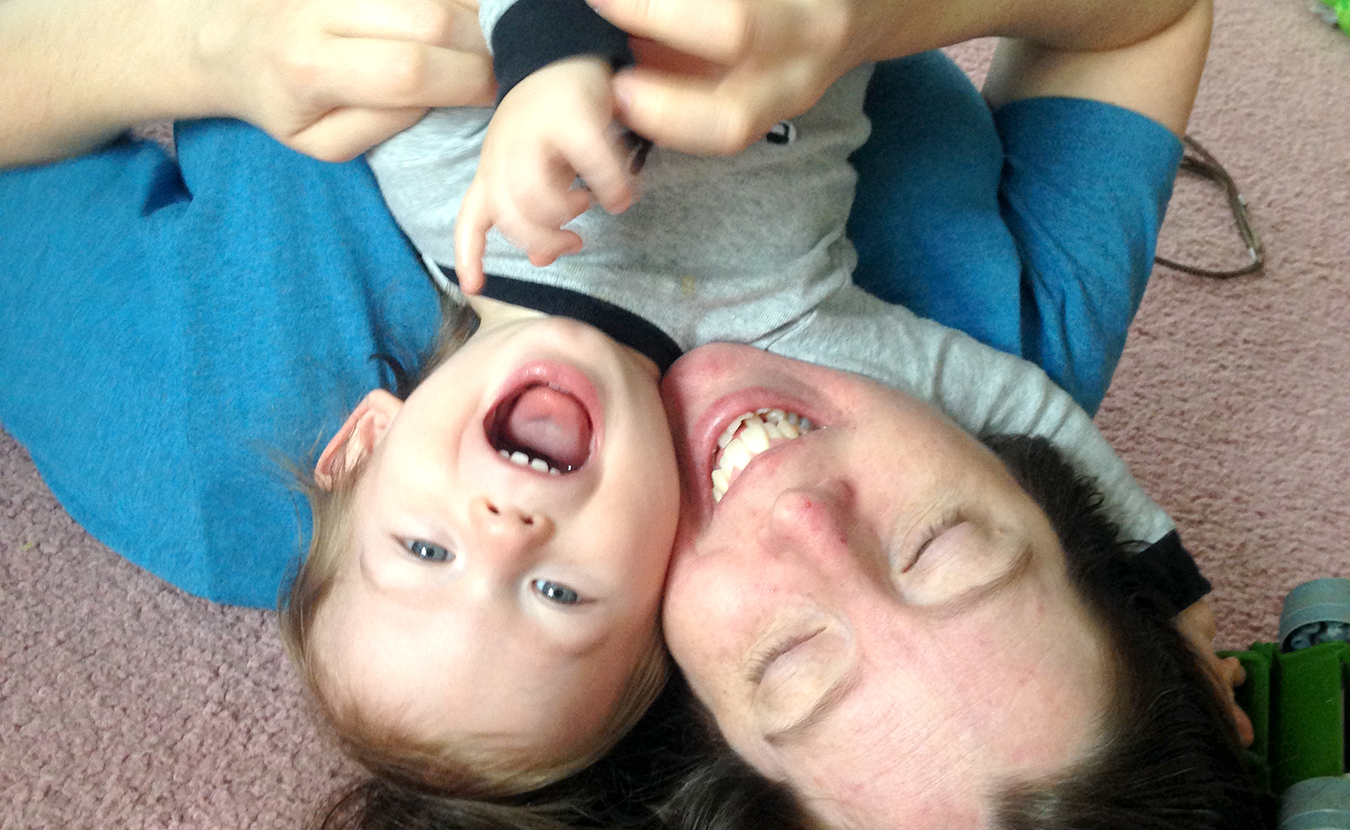How do we reconcile parenting? It hands us some of our happiest moments and many of our most pathetic ones. It inspires us to climb to our best selves, then immediately has us crawling down into our reptilian brain, filling us with anxiety. With endless exhaustion and joy, all the love and irritability, how do we thrive in one of the world’s toughest jobs? According to research, one possibility is by goofing off.

Posey cuts the lawn while his son plays in the yard. | Photo by Katie Posey
Consider: How do our children get through their equally tough role of growing up? They play. In addition to breast milk and broccoli, play is the backbone of our species’ development — benefitting everything from muscle development to emotional intelligence. Neuroscientists, parents, and education experts are starting to realize that play isn’t secondary; it’s the doorway to becoming fully human.
The importance of play
Linda Smith, Ph.D., heads a team of researchers at the Cognitive Development Lab at Indiana University who explore how children perceive, learn, and grow. “The evidence on the importance of play is compelling,” Smith says. “It is the natural context for learning for infants and children and builds brain networks that are important throughout life.”
It seems no aspect of learning is left untouched by play. All the cornerstones in childhood development — creative thinking, problem solving, relationship building, regulating emotions, the list goes on — are primarily built through play. Most play behaviors are so mundane to adults, it is easy to overlook their magic. Our understanding of play requires richer interpretations of child behaviors and activities.
Think about it. We dismiss trivial matters as mere child’s play. Researchers now have a different image. In his book Playful Parenting, Lawrence Cohen, Ph.D., says, “Many experts describe play as a place — a place of magic and imagination, a place where a child can be fully one’s self. Play is important, not just because children do so much of it, but because there are layers and layers of meaning to even the most casual play.”

Katie Posey does “silly yoga” with her son. | Photo by Jared Posey
Just to scratch the surface: A child building with blocks is also honing their fine motor skills and cultivating sustained attention; a game of chase allows for the emotional subtleties of closeness and separation, builds confidence, and releases anxiety and pent-up feelings; pretending to be the doctor allows a child to experiment with adult roles, regain a sense of power, and think imaginatively of themselves.
Parents’ role in play
Giesla Potter, a Bloomington mom, remembers the first time she saw playfulness in her baby boy. He was 3 months old and laughed at the shaking of a rattle. As he now ages into toddlerhood, play is center-focus in his world. Other parents may relate that play often even wins out over survival necessities, such as eating and sleeping.
It can be hard for parents to find the time to fit play in with life’s other demands. But Potter thinks it’s worth it. She says, “It’s letting go of that constant feeling of having to get the next task or to-do list item, and to tune in to what is a million times more important — time with our son.”
Play helps build family-wide cooperation and joy. Based on researchers such as Cohen, and what I’ve put into practice in my own home, here are six ways you can use play in your home:
- Set aside special time: This means to turn the smartphone off, clear the calendar, and be absolutely present with your child. Then, play! It might sound sacrilegious, but it may help to schedule play into your day if you’re extra busy and find it hard to dedicate the time.
- Act out emotions: Use stuffed animals to act out emotions, so that early on a child begins to learn their own emotions and those of others. Give words to the emotions they’ll be seeing all around them. Play, and especially laughter, is one of the most effective ways to release pent-up feelings. Play can also be used to recover from emotional distress. Play is a safe space for emotions, and as they age, kids will instinctively use this space to process their overwhelming feelings or experiences.
- Invite cooperation: It’s easy for kids and parents to get locked into power struggles. Sidestep these struggles with play. Play helps kids realize that we’re on their team. When they feel we’re in their corner, parenting goes much smoother. Your kid won’t get dressed? Make it a race. Or be their sportscaster with an English accent. Or write them a note: “Get dressed and meet me in the car for a top secret mission … tell no one.” Kids do most things when they want to, try as hard as we may to convince them otherwise. Make it fun, be on their team, and they’ll listen to you when you need them to.
- Put play to work: Play is great for kids, but they also love to do adult tasks. Get a bonus from your play by having cleaning Olympics, practice drills for school mornings, and family food-prep sessions. Or combine play with your interests: do silly yoga, exaggerated aerobics, or fun walks through the wilderness.
- Use play to reconnect: Leaving kids for the day, or even a few hours, can be a distressing absence. Rather than starting with questions about their day, use play to swing them back into your love and influence. After that, you may even get more than one-word answers. Play can also serve as a momentum shift when times are rough.
- Play as self-care: It’s hard to be there for our kids in any capacity if our tank is empty. Make sure you have a support system and take personal time. Oddly enough, though, play can reenergize you as well as your kids, much in the same way exercise gives you more energy.
Potter’s motto is “Be here now,” to soak up all of those moments that don’t come twice with family. Parenting will never be without challenges. But maybe we can learn one from the kids, as the experts are now doing. Maybe we can get down on the floor or roll around in the dirt while we play our hearts out. Over the long run, it may just make parenting and childhood smoother. It may even start to make for a better world. So how do we reconcile parenting? Perhaps we do so when we trust our kids and start to take child’s play a little more seriously.


